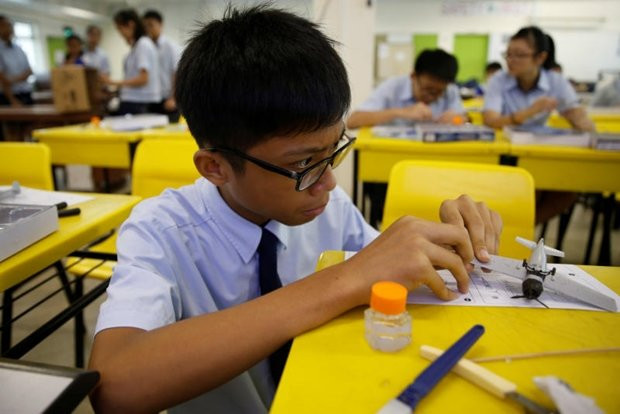What does Singapore do to have the best teachers?
In recent days, public opinion in the country has been worried and anxious about the continuing “rock bottom” of the entrance scores for the education sector. In countries with developed education systems, such as Singapore, how are education students recruited?
 |
| A child assembles a model airplane in a classroom in Singapore. Photo: Reuters |
To have a highly qualified teaching staff, Singapore focuses on the core issue: training good teachers and effective educational leaders.
In fact, the Singapore government did not wait for sudden talents to appear, but in fact, since the mid-1980s, they have developed a comprehensive system including the selection, training, treatment and development of teachers as well as school leaders.
Choose "genuine" students who love the job
According to the Asia Society website, the Singapore Ministry of Education has carefully selected potential teachers from the top third of students in terms of academic achievement after graduating from high school.
Although academic achievement is essential, equally important in those selected is a love and commitment to teaching.
These potential teachers will receive a subsidy equivalent to 60% of the official teacher's salary during their training period. However, in order to enjoy this benefit, they must also commit to teaching for at least 3 years after officially entering the profession.
All teachers are required to be trained on the Singapore curriculum at the National Institute of Education at Nanyang Technological University, where they will earn a bachelor's degree or higher, depending on their starting point.
The National Institute of Education also has close ties with schools because in specific schools, master teachers will play a leading role, providing guidance and mentoring to all new teachers for many years.
Decent treatment
Every year, the Singapore Ministry of Education conducts an audit of starting salaries for different professions, and accordingly adjusts the salaries for newly graduated teachers to ensure that in the eyes of new graduates, the teaching profession is as attractive as other professions.
Over time, although teachers' salaries have not increased as much as those of other professions, they have been given access to a variety of opportunities to take on roles other than that of a teacher.
Teachers are entitled to 100 hours of professional development each year. This is done in a variety of ways.
Alternatively, they will take courses at the National Institute of Education that focus on a particular subject or pedagogical knowledge, and can also give teachers the opportunity to gain higher qualifications.
Much of this professional development time is delivered at the school where the teacher is teaching, and is delivered by the school's own workforce development specialists.
These experts are responsible for identifying existing problems in the school, such as the math problems of a group of students, or introducing new teaching methods... thereby developing the careers of teachers.
Every school has a dedicated fund to support teacher development, including expanding new perspectives on education for teachers and enabling them to visit effective educational models in other countries.
In 2010, the Singapore Teacher Centre was launched to encourage teachers to actively share best teaching practices.
Just like every other profession in Singapore, every year the education sector of this country has specific awards to honor the achievements and outstanding contributions of teachers to the education cause.
Many career development opportunities
After three years of teaching, teachers are assessed annually to see which of three development pathways they have the potential to take related to their field: becoming a master teacher (i.e., able to mentor less experienced teachers), a curriculum or research specialist, or a school leader.
Teachers with the potential to develop into school leaders will be moved to middle management and trained to take on the new role.
The performance of these middle managers will be evaluated to see if they have the potential to become vice principals, and later principals.
At each stage there is a range of experiences and training programs that need to be provided to equip these people for management work and to adapt to professional change.
Singaporeans understand very well that to have a high quality education and excellent student performance, they must have effective school leaders.
According to TTO
| RELATED NEWS |
|---|
